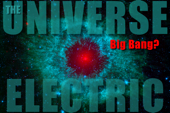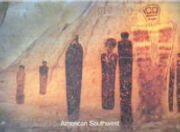The Internet & the Death of Communications - Pt. 1
September 21, 2008
The Internet is both the most useful and destructive
communication tool in world history.
This still infantine technology can connect a Sufi in Darfur
with a personal trainer in Santa Cruz, CA. We are all linked by mechanical
conduits and invisible circuits, a seemingly living matrix whose every
fabric was woven by the collective human consciousness. Nothing
"lives" in this matrix that a human mind didn't invent.
Ergo, it is no overstatement when the World Wide Web consortium
describes the WWW as nothing less than
“the embodiment of human
knowledge.”
This essay is being published and distributed on this "web,"
the most voluminous database of independent, uncensored, worthwhile
information in human history. Make no mistake, if not for this invention,
our species might be in immediate and irredeemable peril. Without the web,
the handful of media conglomerations that have swallowed up all of the
major TV, radio, and print outlets, could promulgate misinformation with
little or no hope of correction. In the pre-Internet age, proponents of
unpopular or "fringe" thought systems were almost exclusively
relegated to public access television and short-wave radio. Today, anyone
with a web-cam and an opinion can freely broadcast his views around the
globe, with a nearly unlimited potential audience. This unprecedented
means to spread unfettered information and viewpoints has already affected
stupendous real world changes. In the last year, the Presidential campaign
of a relatively obscure figure, Congressman Dr. Ron Paul, achieved a
groundswell of support based on and driven by Internet communications.
Indeed, a whole new medium of communication - "blogging" - has
arisen as a serious competitor of newspapers and magazines, even (in the
minds of some) jeopardizing the commercial viability of print publications.
But human beings are intrinsically flawed, so nothing human consciousness
has created has ever been perfect. The Internet is no exception. Our
ugliness, weakness, ignorance and debasement burst forth coincident with
our beauty, intelligence, power and grace. I'd like to believe that the
latter human qualities predominate our culture, including the infinite
cyber-maze that is the WWW, but sadly, they do not. I don't know precisely
how many Americans are members of what might be called the "lowest
common denominator," but I do know this denominator tends to make
the most noise.
When Andy Warhol observed, “Everybody
is famous for fifteen minutes,” he surely presaged this era
of YouTube kings and queens, these MySpace gods and goddesses, a million
faces and voices all competing for a fleeting moment of attention. An
endless quest for "love" in the form of hit counts and five-star
ratings. On the plus side, collective and individual narcissism can sometimes
provide incentive for real creative brilliance -- many artistic and intellectual
geniuses had immature or downright schizophrenic motives. But everywhere in
cyberspace, we see the signs that the "inmates are running the asylum.
" If discourse, dialog, circumspection, and humility are the tools of
the enlightened, then shouting, bleating, ignorance and arrogance are the
tools of the wretched.
Forbes Magazine recently described the aforementioned YouTube as the world's
largest TV station (it's also been characterized as "the world's largest
magazine rack," and even "the world's largest focus group.")
Make no mistake, the aggregate quality of content on YouTube might exceed that
of all the world's media conglomerations combined (in this context, *quality*
refers to both entertainment and information). The FCC, corporate chairmen,
and self-serving advertisers have no influence on 'YouTubers', so artists and
advocates of every flavor are relatively free to express themselves - and
freedom has always been the greatest catalyst of creativity. That's the
considerable upside; the downside is the same as in every other medium --
the most inane, grotesque, inhuman spectacles always seem to attract the
most attention.
YouTube word searches yield some interesting results. A search of the words
- fire fart - (unquoted) yield just under 4,000 hits. The first result has
been viewed over 3,000,000 times. The video's description reads, "Did
u know that one person's energy contained in farts for a period of 6 years
and 9 months can be comparable to an atomic bomb??" (Now that's a
question Mr. Wizard is most unlikely to have ever answered.) Videos related
to this one include 'Jurassic Fart,' (3.6 million views), 'MythBusters - Do
Pretty Girls Fart' (4.5 million views), 'Farting Idol' (2.1 million views),
'Beth's Gigantic Fart' (1.5 million views), and 'The biggest fart ever' (over
1 million views.) Perhaps this clarifies why extremely popular Internet items
are described as "viral" -- the sickness is passed from one computer
to another until finally most everyone is infected and dying.
If cognition weeps over YouTube's most popular videos, it runs screaming
"Jesus Christ, hallelujah" over the YouTube comment sections.
At a ratio optimistically figured at 7,897 to 1, the illiterate, debased,
feverishly grotesque remarks outnumber the intelligent, reasonable, and
constructive ones. Even by the low standards of any unmoderated forum,
logic and decency in YouTube comments are conspicuously absent. Of course,
it's not entirely coincidental that all comments are restricted to a mere
450 characters, restricting most "conversations" to brute
shouting matches. Nevertheless, the opinions and assertions of countless
YouTube posters are consistently disturbing. Viciously racist, sexist,
nationalistic, xenophobic, bullying, profane, perverted, upside down
backward comments are the rule, not the exception. Indeed, it is not at
all surprising that comments for Martin Luther King, Jr.s' "I Have
a Dream" speech (over 4 million views) are presently disabled --
surely, the only other option for the video's owner was to allow the
contamination of the page by virulent, sadistic, inhuman graffiti. It's
also telling that many videos that lean toward profundity -- say, a speech
by Gandhi with over 30,000 views -- have virtually no comments, while prank
phone calls, celebrity sex videos, and professional wrestling matches
receive new comments (or rather, attempted comments by people who never
learned to read or write) roughly every 1.5 seconds.
This leads me to ask the question: exactly when and how was the Internet
completely overrun by random "comments"? One is hard pressed to
find a blog or purported "news service" that doesn't feature
comment sections accompanying every essay, news article, video, and blog
entry (the Thunderblog being one of very few yet welcome exceptions to
this). Granted, on a few occasions, the intellectual content of the user
comments may actually exceed that of the item they're responding to. But
really, do all these pinched, short, unscreened, generally ill-formed and
horrendously written "comments" enhance or diminish the power of
the presentations? Imagine if history's greatest authors had been forced
to include random reader comments in all of their books. On the inside
jacket of Hemingway's "A Farewell to Arms," we might read:
KevinOwnsUFuck98 writes: "Dude, u r fat & old. Wash your krotch b4
u spred your legs."
We also see demonstrated the steady injection into the collective lexicon
of so-called "leet-speaking" -- a form of quasi-shorthand via
the worlds of 'gaming,' text messaging, and Internet chat rooms. Most of
us who regularly communicate electronically (in other words, the large
majority of the industrialized world) have at least a vague familiarity
with this so-called 'jargon.' Some examples include LOL (laughing out
loud), btw (by the way), j/k (just kidding), stfu (shut the f*** up),
and WAY too many others to even partially list here. The question of
whether this rather cryptic code actually stunts learning and language
skills is controversial. But some language purists (i.e., generally
people who either learned to read and write before the public schools
had been hopelessly dumbed down, or through private schooling, or
independent study) view "leet-speaking" as yet another in an
endless series of devastating blows to English grammar. You knew it was
only a matter of time, and it's finally begun to happen: some youngsters
who've spent their whole lives jacked into electronic communications now
utilize "leet-speaking" in their oral conversations. Have you
recently heard a kid say "lol" or "lulz" as an
expression of amusement, and wondered what the hell he was talking
about? Well, now you know.
Now imagine the endless nightmare faced by moderators of Internet forums.
Since everyone feels entitled to post public comments (no matter how inane,
abusive, profane, or incoherent), and since any "filtering" of
comments leads to accusations of *censorship,* how can one operate a forum
while maintaining a minimum of decency and decorum? The answer is,
regrettably few do, and most if not all are overrun by extended bouts of
controversy and bedlam. This illustrates two things:
-
Internet communications must be handled more delicately than one-on-one
human relations. The obvious reason for this is, when two people argue
over a computer, the usual human elements of empathy and politeness go
completely out the window. For one thing, you don't see your *antagonist*
-- the look in his eyes, that sense of another human -- nor can you know
the full intent behind his every remark. Indeed, many corporations now
guide their employees through comprehensive training on email and forum
etiquette, advising them to always wait and reflect on their writings
before hitting the irretrievable "send" or "post"
command.
-
In the United States (and throughout much of the Western world, and beyond),
education, literacy, and social decorum seem to be heading in the wrong
direction. Tragically, the electronic age only seems to have worsened our
social malaise. The irony is, we "communicate" with one another
more easily today than ever before. But for reasons stated above, these
"communications" tend to lack real human connectedness. Consider
that more Americans than ever utilize email, cell phones, text messaging,
etc., to keep in touch with friends and family, yet increasingly we are
isolated and lonely. One fairly recent news story illustrating this point
reads: “...an authoritative study in
the American Sociological Review found that the average American had only
two close friends in whom they would confide on important matters, down
from an average of three in 1985. The number of people who said they had
no such confidant soared from 10 percent in 1985 to nearly 25 percent in
2004; an additional 19 percent said they had only one confidant — often
their spouse.” (From
http://www.msnbc.msn.com/id/14126192/)
The purpose of this essay is not to scapegoat the Internet for our culture's
decline. Rather, this preexisting spiral has continued unabated, despite our
improved abilities to dispense and consume unfettered information, and to
"communicate" with one another anywhere in the world. As I stated
at the outset, the WWW is a reflection of human consciousness, for better and
worse. And collectively, our consciousness is not in the brightest place right
now. All statistics and rhetoric lamenting the failures of our educational
system aside, simply look out your window at the street, at all those heavy-set
frowning folks with their Ipods and cellphones. These bloated disconnected
atoms in an icy-cold vacuum. And ask yourself just how in the hell "people
like that" -- i.e. people like you, people like ME -- might ever hope to
communicate with one another. On the Internet, over the phone, or screaming
through our car windows with our pedals to the floor at 90 MPH.
POSTSCRIPT: The first version of this essay featured a few comments that may
have been overwrought. [This slightly altered version posted on September 24]
In one instance, I stated, "Human education and
literacy has reached its darkest depths in contemporary history." At best,
this remark may have confused the reader, since "contemporary history"
is a deliberately vague term. Also, in recent decades, many impoverished nations
have experienced marked improvements in education and literacy, so to speak too
broadly of a "human" decline in these areas may not be accurate. I
hope this piece is mostly reasonable, and might stir some meaningful discourse
out here in cyberspace.
Part Two, coming soon: Wikipedia
Michael Goodspeed
|
|
|
Permalink to this article.
Public comment may be made on this article on the
Thunderbolts Forum/Thunderblogs (free membership required).
|
|
|
|
|

Michael Goodspeed is a freelance journalist who lives in Beaverton, Oregon
My Archives
Chronological Archives
Archives by Author
Archives by Subject
Thunderblogs home
|




